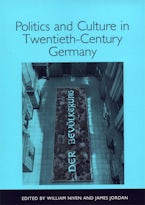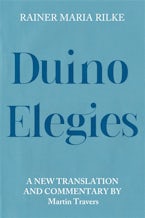
Title Details
254 Pages
22.8 x 15.2 cm
3 b/w illus.
Series: Studies in German Literature Linguistics and Culture
Series Vol. Number:
102
Imprint: Camden House
German Culture, Politics, and Literature into the Twenty-First Century
Beyond Normalization
- Description
- Contents
- Author
- Reviews
The first major study of the contemporary German debate over "normalization" and its impact across the range of cultural, political, economic, intellectual, and historical discourses.
This volume features sixteen thought-provoking essays by renowned international experts on German society, culture, and politics that, together, provide a comprehensive study of Germany's postunification process of "normalization." Essays ranging across a variety of disciplines including politics, foreign policy, economics, literature, architecture, and film examine how since 1990 the often contested concept of normalization has become crucial to Germany'sself-understanding. Despite the apparent emergence of a "new" Germany, the essays demonstrate that normalization is still in question, and that perennial concerns -- notably the Nazi past and the legacy of the GDR -- remain central to political and cultural discourses and affect the country's efforts to deal with the new challenges of globalization and the instability and polarization it brings. This is the first major study in English or German of the impact of the normalization debate across the range of cultural, political, economic, intellectual, and historical discourses.
Contributors: Stephen Brockmann, Jeremy Leaman, Sebastian Harnisch and Kerry Longhurst, Lothar Probst, Simon Ward, Anna Saunders, Annette Seidel Arpaci, Chris Homewood, Andrew Plowman, Helmut Schmitz, Karoline Von Oppen, William Collins Donahue, Kathrin Schödel, Stuart Taberner, Paul Cooke
Stuart Taberner isProfessor of Contemporary German Literature, Culture, and Society and Paul Cooke is Senior Lecturer in German Studies, both at the University of Leeds.
This volume features sixteen thought-provoking essays by renowned international experts on German society, culture, and politics that, together, provide a comprehensive study of Germany's postunification process of "normalization." Essays ranging across a variety of disciplines including politics, foreign policy, economics, literature, architecture, and film examine how since 1990 the often contested concept of normalization has become crucial to Germany'sself-understanding. Despite the apparent emergence of a "new" Germany, the essays demonstrate that normalization is still in question, and that perennial concerns -- notably the Nazi past and the legacy of the GDR -- remain central to political and cultural discourses and affect the country's efforts to deal with the new challenges of globalization and the instability and polarization it brings. This is the first major study in English or German of the impact of the normalization debate across the range of cultural, political, economic, intellectual, and historical discourses.
Contributors: Stephen Brockmann, Jeremy Leaman, Sebastian Harnisch and Kerry Longhurst, Lothar Probst, Simon Ward, Anna Saunders, Annette Seidel Arpaci, Chris Homewood, Andrew Plowman, Helmut Schmitz, Karoline Von Oppen, William Collins Donahue, Kathrin Schödel, Stuart Taberner, Paul Cooke
Stuart Taberner isProfessor of Contemporary German Literature, Culture, and Society and Paul Cooke is Senior Lecturer in German Studies, both at the University of Leeds.
Introduction - Stuart Taberner and Paul Cooke
"Normalization": Has Helmut Kohl's Vision Been Realized? - Stephen Brockmann
Coping with Disparity: Continuity and Discontinuity in Economic Policy since Unification - Jeremy Leaman
Understanding Germany: The Limits of "Normalization" and the Prevalence of Strategic Culture - Sebastian Harnisch
Understanding Germany: The Limits of "Normalization" and the Prevalence of Strategic Culture - Kerry Longhurst
"Normalization" through Europeanization: The Role of the Holocaust - Lothar Probst
"Representing Normality": Architecture in Berlin - Simon Ward
"Normalizing" the Past: East German Culture and Ostalgie - Anna Saunders
National Memory's Schlüsselkinder: Migration, Pedagogy, and German Remembrance Culture - Annette Seidel Arpaci
The Return of "Undead" History: The West German Terrorist as Vampire and the Problem of "Normalizing" the Past in Margarethe von Trotta's Die bleierne Zeit (1981) and Christian Petzold's Die innere Sicherheit (2001) - Chris Homewood
"Normalizing" the "Old" Federal Republic? The FRG between 1949 and 1989 in Recent German Fiction - Andrew Plowman
Reconciliation between the Generations: The Image of the Ordinary German Soldier in Dieter Wellershoff's Der Ernstfall and Ulla Hahn's Unscharfe Bilder - Helmut Schmitz
"(un)sägliche Vergleiche": What Germans Remembered (and Forgot) in Former Yugoslavia in the 1990s - Karoline von Oppen
"Normal" as "Apolitical": Uwe Timm's Rot and Thomas Brussig's Leben bis Männer - William Collins Donahue
"Narrative Normalization" and Günter Grass's Im Krebsgang - Kathrin Schodel
From "Normalization" to Globalization. German Fiction into the New Millennium: Christian Kracht, Ingo Schulze, and Feridun Zaimogølu - Stuart Taberner
Abnormal Consensus? The New Internationalism of German Cinema - Paul Cooke
Notes on the Contributors
Index
"Normalization": Has Helmut Kohl's Vision Been Realized? - Stephen Brockmann
Coping with Disparity: Continuity and Discontinuity in Economic Policy since Unification - Jeremy Leaman
Understanding Germany: The Limits of "Normalization" and the Prevalence of Strategic Culture - Sebastian Harnisch
Understanding Germany: The Limits of "Normalization" and the Prevalence of Strategic Culture - Kerry Longhurst
"Normalization" through Europeanization: The Role of the Holocaust - Lothar Probst
"Representing Normality": Architecture in Berlin - Simon Ward
"Normalizing" the Past: East German Culture and Ostalgie - Anna Saunders
National Memory's Schlüsselkinder: Migration, Pedagogy, and German Remembrance Culture - Annette Seidel Arpaci
The Return of "Undead" History: The West German Terrorist as Vampire and the Problem of "Normalizing" the Past in Margarethe von Trotta's Die bleierne Zeit (1981) and Christian Petzold's Die innere Sicherheit (2001) - Chris Homewood
"Normalizing" the "Old" Federal Republic? The FRG between 1949 and 1989 in Recent German Fiction - Andrew Plowman
Reconciliation between the Generations: The Image of the Ordinary German Soldier in Dieter Wellershoff's Der Ernstfall and Ulla Hahn's Unscharfe Bilder - Helmut Schmitz
"(un)sägliche Vergleiche": What Germans Remembered (and Forgot) in Former Yugoslavia in the 1990s - Karoline von Oppen
"Normal" as "Apolitical": Uwe Timm's Rot and Thomas Brussig's Leben bis Männer - William Collins Donahue
"Narrative Normalization" and Günter Grass's Im Krebsgang - Kathrin Schodel
From "Normalization" to Globalization. German Fiction into the New Millennium: Christian Kracht, Ingo Schulze, and Feridun Zaimogølu - Stuart Taberner
Abnormal Consensus? The New Internationalism of German Cinema - Paul Cooke
Notes on the Contributors
Index
"Whether the Berlin Republic has achieved some form of 'normality' comparable to other European nation states or whether Germany's singularity, the 'abnormality' of its Holocaust past will persist ... is the focus of the volume's 15 chapters. ... The breadth of viewpoints can be regarded as a model of successful cultural studies.... A first-rate volume." GERMAN STUDIES REVIEW
"With its cross-disciplinary approach, the book provides a good overview of the discursive shifts that have accompanied German identity debates since the 1990s." MODERN LANGUAGE REVIEW
"Students will appreciate the clarity of the writing and the information on quite recent developments in Germany...." MONATSHEFTE
Paperback
9781571135124
July 2011
£32.99 / $39.95
Ebook (EPDF)
9781571136787
September 2006
£24.99 / $29.95
Title Details
254 Pages
2.28 x 1.52 cm
3 b/w illus.
Series: Studies in German Literature Linguistics and Culture
Series Vol. Number:
102
Imprint: Camden House






















